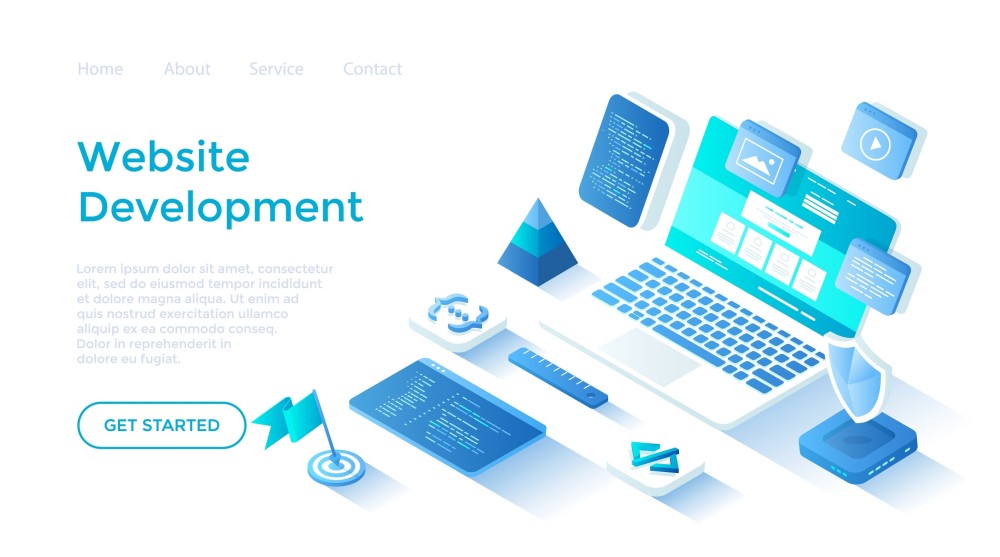Developers consider web development frameworks to improve code quality and streamline the web development process. Frameworks play an integral role in saving developers’ efforts and time by offering pre-written and usable codes. If you are new to programming and want to discover such time-saving hacks with minimum learning curves, you are in the right place. So, get a detailed overview of web development frameworks, including their benefits, types, and top 10 frameworks.
What is a Web App Development Framework (WDF)?
Generally, a web development framework is a collection of resources, tools, and technologies that can assist in developing and managing a website. Additionally, these frameworks assist software developers in designing web services, online applications, and APIs (Application Programming Interfaces).
Such frameworks offer an extensive range of codes, pre-written components, and application templates tailored for diverse business needs. Besides, they comprise some components, such as basic codes, functions, utilities, subsystems, and rules, for comprehensive assistance.
Overall, web frameworks are like software environments or infrastructure of software solutions that facilitate the development of complicated and large-scale tasks. Apart from that, one can also use web application framework (WAF) and web framework (WF) terms for web development framework (WDF).
Major Benefits of Using Web Development Frameworks
As you know what a framework is in web development, let’s extend your knowledge by highlighting the benefits of web frameworks. For this purpose, you can consult the given points and learn how such frameworks save developers valuable time, etc.
- Enhanced Security: Frameworks include standardized methods and built-in security features to protect the website against threats. Therefore, developers are satisfied with protecting their developed sites and apps from unauthorized access during the procedure.
- Accelerated Development and Flexible: Another benefit of web frameworks is their flexibility, which means developers can modify components in their applications as required. Also, developers don’t need to write lines of code because they can use pre-defined templates and save coding efforts.
- Code Reusability and Efficiency: The main goal of a web development framework is to reduce the development time by reusing code tested earlier. Significantly, it leads to code efficiency when you don’t need to rewrite codes for every application and quickly execute complex code-related tasks.
- Cross-Platform Compatible: What’s better than developing an application that can run on multiple platforms? Notably, you can launch cross-compatible applications to increase your reach to different operating system users, which is crucial for a positive user experience.
What are the Web Framework Types?
Before delving into the list of best frameworks for web development, note that there are 3 categories of web frameworks. In this section, you will encounter fundamental categories that shape the digital landscape so you can enhance your comprehension:
1. Front-End Framework
In simple words, front-end frameworks comprise the user-facing parts of a web application, also known as user-side or client-side frameworks. They are equipped with ready-to-use components, codes, and templates to generate interactive webpages via industry standards like CSS, JavaScript, and HTML. Furthermore, they can make web pages dynamic by adding animations and increasing responsiveness.
2. Back-End Framework
Server-side frameworks focus on the inner structure of digital creation and are designed to support the server component of web applications. Moreover, they are responsible for processing HTTP requests, mapping URLs, and interacting with data resources with Python, Ruby, and Java programming languages.
3. Full-Stack Framework
A full-stack web development framework comprises tools that provide end-to-end website creation solutions. It encompasses front-end user interfaces and back-end servers, which are integral to building a web application.
5 Best Front-End Frameworks for Web Development
To make an attractive interface for web pages, you might need front-end frameworks to help you in the development process. For this reason, we have researched the top web frameworks you can consider as a developer. So, lets straightforward jump into the list:
1. Next.js
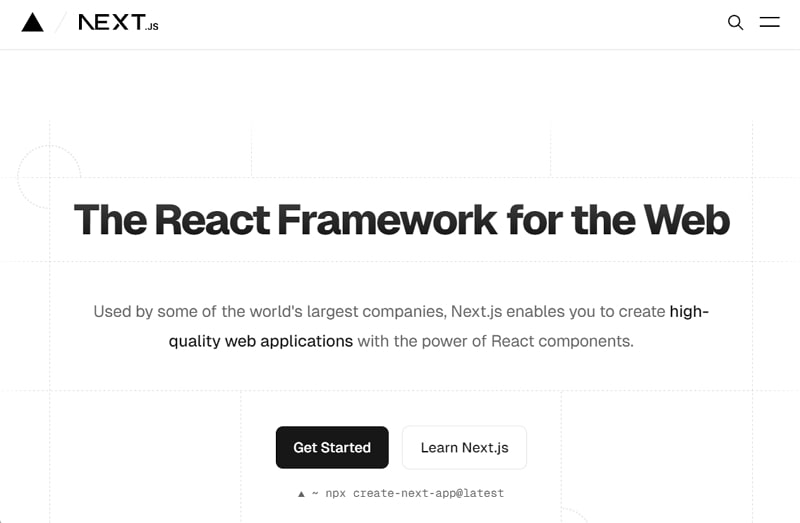
Next.js is a powerful front-end framework with built-in user experience optimization and automatic image, font, and script development components. This web development framework enables server-side code directly from components without needing a separate API. Moreover, it provides you with the flexibility of styling with popular community libraries and improves the functionality of the project.
Pros
- It utilizes virtual DOM that allows efficient updates to smoother the user experience and faster rendering of changes.
- This web software development framework allows you to build reusable UI elements to save development time and promote consistency across your application.
Con
- It might be beginner-friendly for those with experience with JavaScript, but it is complex with concepts and syntax for new developers.
You may also like: Top 10 Next.js Alternatives You Can Try
2. Angular
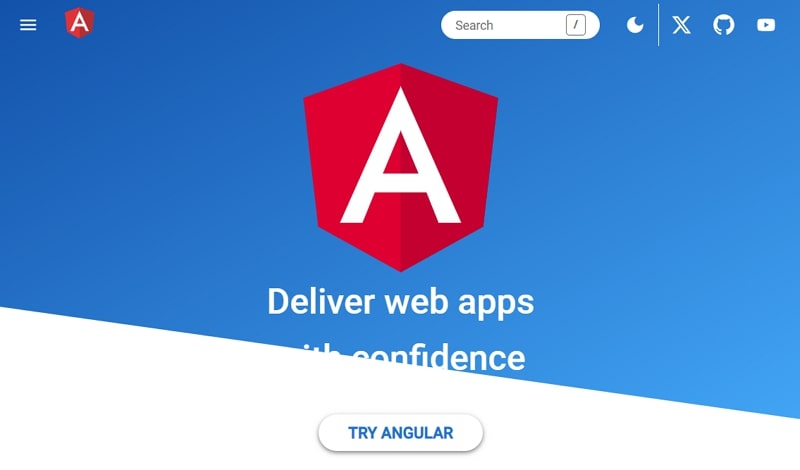
If you ever forget about this most popular web development framework, your front-end development is incomplete. It promotes the development of applications using reusable UI components that compress logic, data, and presentation. Angular offers built-in routing capability to handle different views within the application. Moreover, it allows a testing-first mentality through built-in tooling for unit and end-to-end testing.
Pros
- Angular allows you to create exceptional interfaces with various Angular materials and pre-built components.
- Using this framework will streamline the coding process and make development more efficient with features like refactoring services and improved navigation.
Con
- Migrating applications from AngularJS to Angular might be an issue due to significant changes between the two versions.
3. jQuery
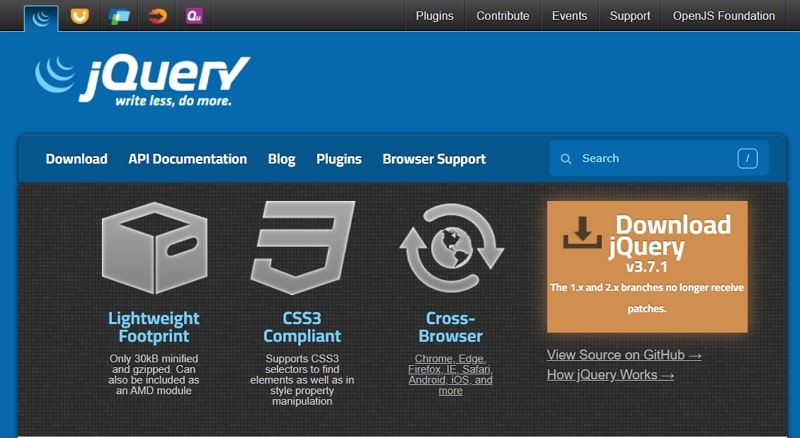
jQuery is also a reliable web development framework, not a full-fledged front-end framework like React or Angular. Developers can create dynamic and engaging animations to make web pages interactive using jQuery’s animation library. Furthermore, it is lightweight and has a smaller footprint than other web frameworks, making web pages slower.
Pros
- jQuery can address browser inconsistencies by providing a unified API for DOM manipulation and event handling across browsers.
- Besides, this web framework provides pre-made solutions for common functionalities like animations and form validations, saving you time and effort during development.
Con
- Beginner developers might face complexity when learning more advanced JavaScript concepts, such as how the browser and JavaScript engine work together.
You may also like: Angular vs jQuery – Difference Between Angular and jQuery
4. Ember
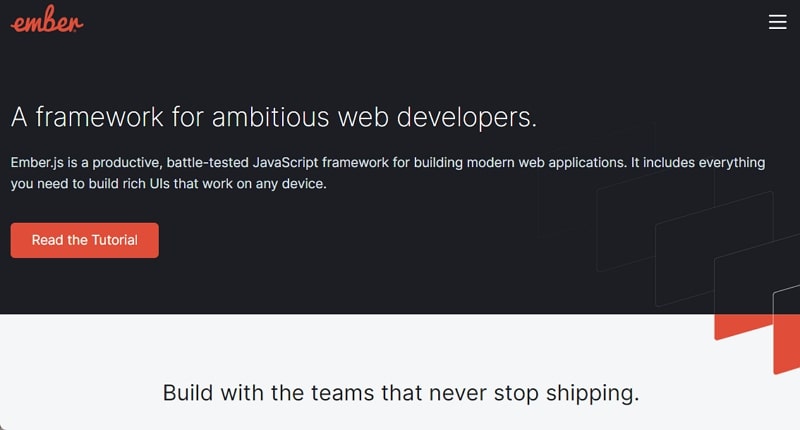
This best web development framework can streamline project setup or testing and automate repetitive tasks to boost developers’ productivity. You can use the Ember.js community and its diverse add-ons that will extend functionality depending on your needs. Besides, its easy configuration process will save you time and keep the codebase clean.
Pros
- Ember.js has built-in features like routing and templating to accelerate development cycles, which allows developers to quickly create prototypes and MVPs.
- Additionally, it provides a robust command line interface to streamline project setup, testing, and development workflows.
Con
- Ember’s extensive functionality might lead to over-engineering that may not be required for small project needs, which leads to unnecessary complexity.
5. Vue.js
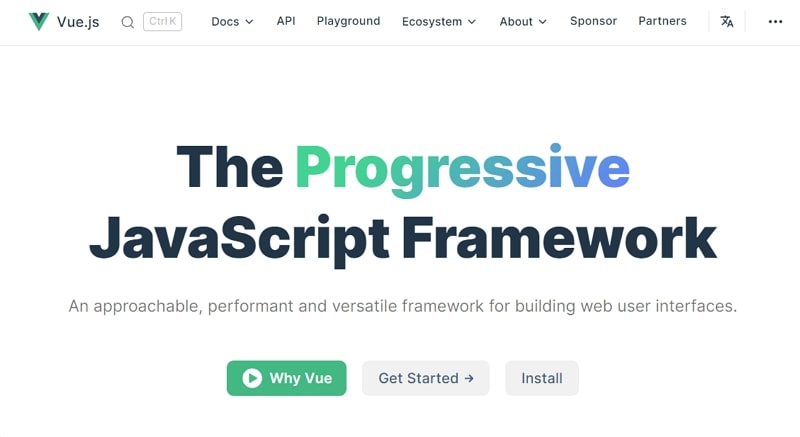
Vue.js is popular for providing convenience to its users through ease of learning and use. This most popular web development framework prioritizes performance with an efficient virtual DOM implementation that decreases unnecessary DOM manipulations. Moreover, Vue.js offers versatility in handling various projects, from simple websites to complex single-page applications.
Pros
- This Java web development framework boasts comprehensive and well-written documentation, which makes it easier for developers to learn and use frameworks.
- Plus, it’s popular for its clean syntax and intuitive API, which makes it well-known among beginner developers.
Con
- Vue.js doesn’t have a vast community like other frameworks, so fewer resources are available to solve your problems.
5 Best Back-End Frameworks for Web Development
Now that you are familiar with the top 5 best front-end web development frameworks. To make your web pages more functional, you probably want to customize the back end of the web applications. For this reason, we have mentioned a list of 5 best back-end frameworks that will help you build a successful project.
1. Django
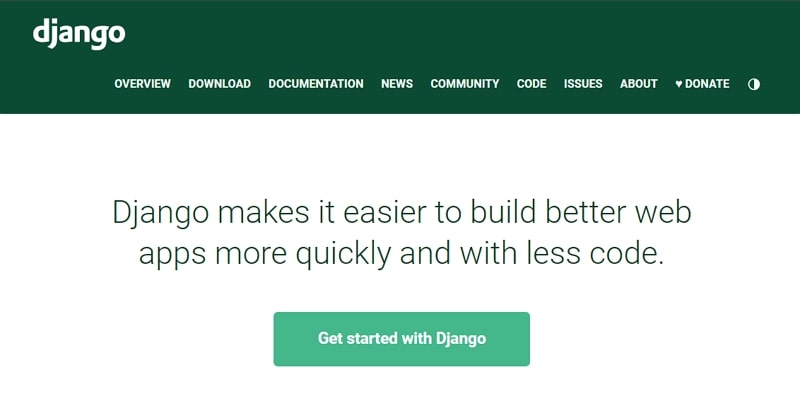
Django is a featured-packed back-end Python framework that provides a clean and flexible URL routing system to map incoming URLs. This framework has a built-in template engine to separate your application’s logic from its presentation. With Django, you can build HTML templates with dynamic content placeholders, which makes it easier to maintain and update the UI.
Pros
- It is fast and easy to operate, which will help you streamline design and clear syntax efficiently.
- This Python framework for website development has built-in protection against common threats like SQL injection and forgery.
Con
- Django is considered less flexible for scaling and deploying specific components independently.
2. Express
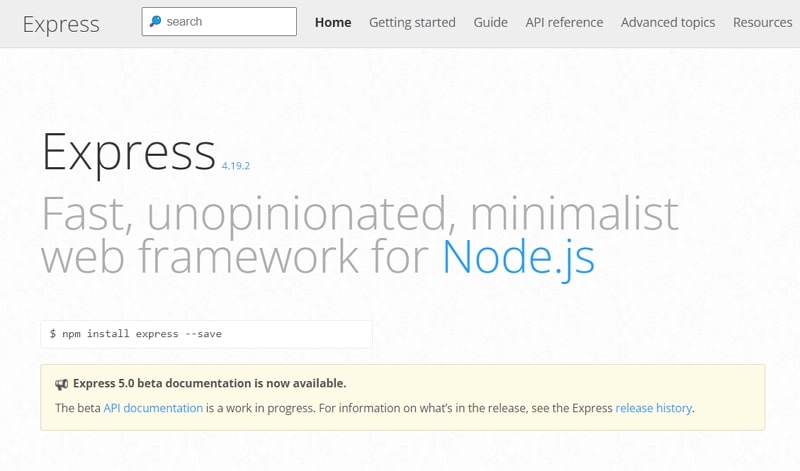
This web software development framework allows you to create scalable web applications with middleware and third-party libraries. Express can also integrate with various template engines such as Pug and EJS to give personalized and premium to your web applications. Overall, this back-end framework is also part of MERN and MEAN stacks, which are pretty popular for full-stack development.
Pros
- As a beginner developer, you only need existing JavaScript knowledge to lower the barrier to building server-side applications.
- Express.js can create cross-platform web applications so that you can reuse a single codebase for your back-end logic on different platforms.
Con
- This web framework is unsuitable for interactive applications and handling resource-intensive tasks.
3. Laravel
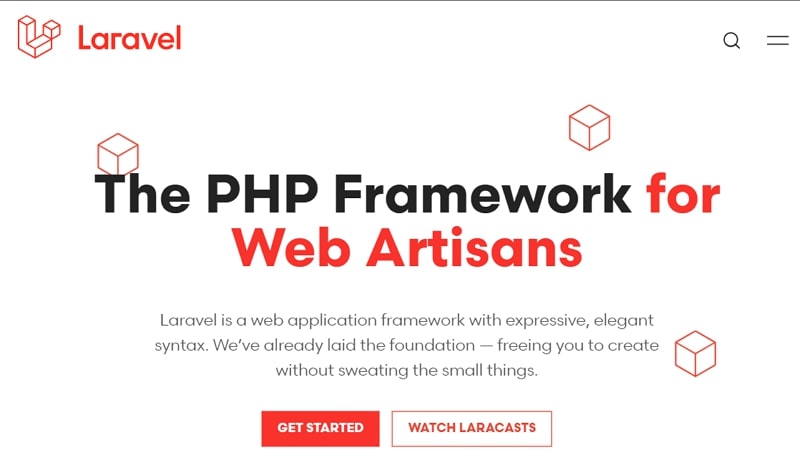
Laravel is the best framework that offers built-in user authentication and authorization features. Despite that, you can improve your project security through user registration, login, and role-based access control by using it. This most popular web development framework offers a blade templating engine to create dynamic HTML views that integrate with your application logic.
Pros
- This web framework simplifies user authentication with built-in access controls and facilitates users on applications’ core functionalities.
- You can also send emails and notifications with Laravel effortlessly. It integrates with major mailing services that offer multi-channel notification support.
Con
- Laravel sometimes introduces significant changes between major versions, which makes it disruptive and requires developers to rely heavily on documentation.
4. Ruby on Rails
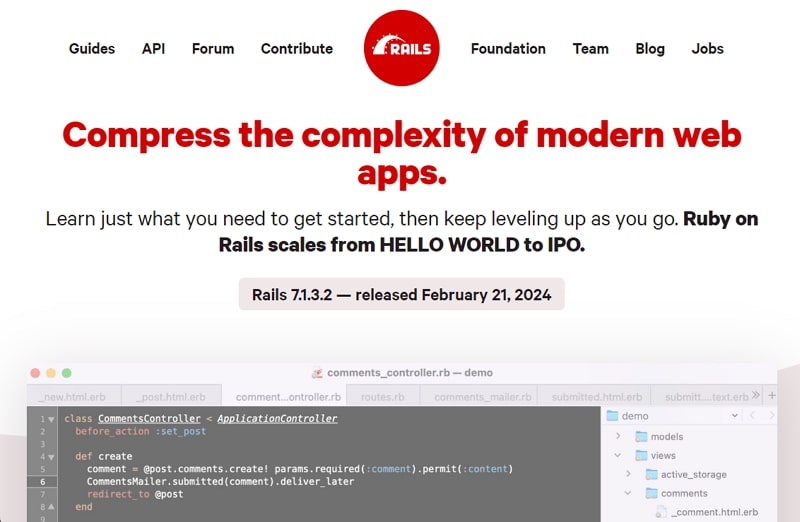
With Ruby on Rails, developers can uplift their development process by utilizing innovative features, conventions, and ecosystems. This, similar to the Python web development framework, helps you focus on writing business logic and functionalities instead of spending time on boilerplate code. Additionally, you can take advantage of their test-driven development (TDD) to ensure the reliability and maintainability of your codes.
Pros
- It enforces conventions to promote consistency across development tasks and simplify collaboration within your team.
- Also, developers can use Rails’ large and active community to troubleshoot issues when they encounter challenges during the process.
Con
- Rails can be less flexible for customized functionalities, which makes it challenging to deviate from the framework’s standards for unique needs.
5. Spring
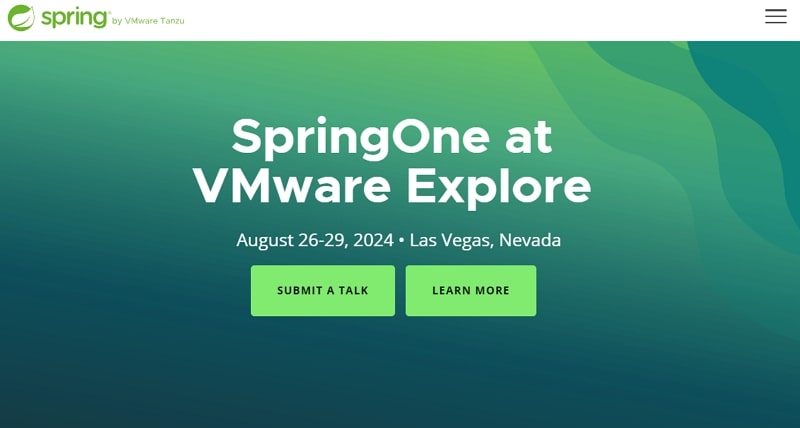
Spring is another good web development framework that allows developers to choose only the necessary components for their development task. This web framework supports Aspect-Oriented Programming (AOP), which allows you to add functionalities like security and transaction management across your application. Overall, you can develop diverse REST APIs, HTML applications, and event-based systems with the help of this web framework.
Pros
- It utilizes lazy initialization to load beans only when needed to reduce application startup time and improve overall performance.
- Plus, this web framework eliminates the need to write boilerplate code and focuses on core application logic.
Con
- For beginners, learning Spring’s configuration options and modular design may get complex compared to simpler web frameworks.
How to Choose the Best Web Development Framework
Building a feature-rich and dynamic website or web application requires careful consideration, and choosing the best web development framework is the most crucial decision. Therefore, this part will give you tips on choosing a reliable web framework since there are many options on the internet.
- Identify Your Project Requirements: To begin exploring a suitable web framework, first analyze your projects’ requirements, whether you need a simple or complex app or site. In this regard, clarify technical constraints, functionalities required in the project, scalability, and languages to avoid.
- Licensing and Documentation: Once you are clear about your project’s requirements, check the licensing of frameworks to pick one that aligns with your project’s goals. Later, look for a clearly documented framework covering all required traits and functionality.
- Ecosystem and Evaluate Community Support: While choosing a web framework, you are advised to consider the strength of its ecosystem and community support, which comes with numerous benefits. Specifically, it includes plugins, a range of libraries, support, and tutorials when you face problems.
- Future Maintenance and Cost: Lastly, verify that the framework will offer long-term maintenance and technical upgrades over the years. Also, confirm whether it’s an open-source web framework, has a subscription fee, or additional charges for premium features.
Supercharging Web Development Frameworks with ZEGOCLOUD Integration
If you have figured out a suitable web development framework, you can make your app or website more interactive via ZEGOCLOUD. It offers predesigned 50+ UI components for feature-rich apps/sites and over 20 pre-built UIKits to create engaging apps. Also, you can benefit from fully customizable SDKs to build custom UI with a few lines of code.
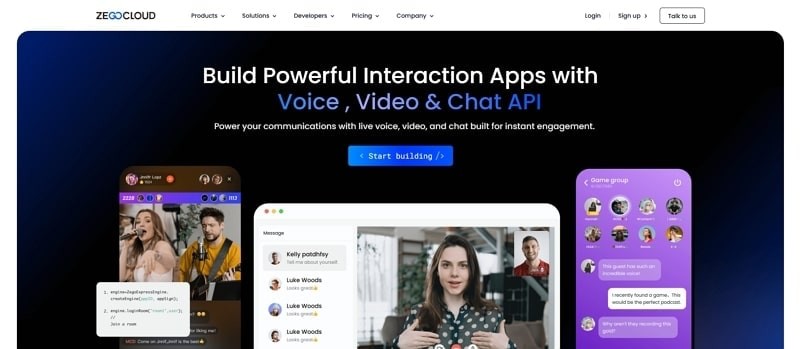
ZEGOCLOUD is a one-stop solution where you can easily integrate countless APIs and SDKs into your apps or websites. In that context, there are video calls, in-app chats, live streaming, AI effects, and voice call APIs. Following that, it also has cloud recording and digital human APIs that can revolutionize communication in your application.
Premium Features of ZEGOCLOUD
- This platform has developer-friendly APIs for developers and cost-effective solutions for businesses, eliminating the need to hire a technical team.
- Talking about its trending product, you can embed high-quality video with group calls, screen sharing, and virtual background features using its video call API.
- Despite that, developers can embed live streaming in their apps with face beautification, recording, and real-time messaging features.
- You can also integrate AI into your platform for voice cloning, AI subtitles, copywriting, avatar cloning, and storyboard creation.
Conclusion
In short, this article covered all the essential information related to web development software, including its introduction and benefits. Besides, we have listed the most popular front-end and back-end frameworks for web development and some factors for choosing the right one. After choosing one, you should try ZEGOCLOUD on your platforms to add communicative features to your apps/sites.
Read more:
Let’s Build APP Together
Start building with real-time video, voice & chat SDK for apps today!









